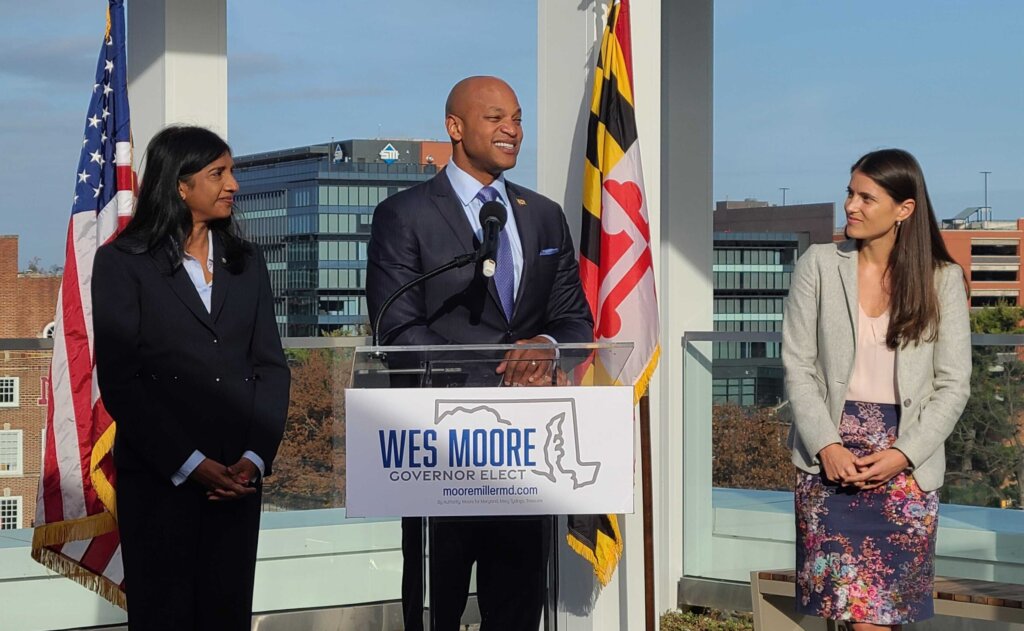
On a rooftop terrace of the University of Maryland’s new School of Public Policy in College Park, Maryland, Gov.-elect Wes Moore unveiled his transition team, featuring Lt. Gov.-elect Aruna Miller at the helm.
“It’s a great day,” Moore said Thursday, “because this is an actualization of something that we’ve been talking about for a very, very long time. And we could not, frankly, think of a more appropriate place to be able to have this conversation and to make this announcement.”
- More Local Politics and Election News
- More Local News
- 2022 Virginia Election Results
- 2022 DC Election Results
- 2022 Maryland Election Results
Moore said throughout the campaign, a few “true North Stars and guidance points” would help shape how they think about the work they’ll be doing.
“We said that this was going to be an administration that looks like the state of Maryland, that this was going to be an administration that was going to be transparent, and that this was going to be an administration that was going to be inclusive. Today, we are proud to announce that commitment and honor that commitment,” Moore said.
Moore become the first Black person to be elected governor of Maryland, and only the third Black governor in U.S. history. Miller also made history becoming the first woman of color and the first immigrant elected to statewide office.
Miller will have four co-chairs for the transition team: Prince George’s County Executive Angela Alsobrooks; President of the Downtown Partnership of Baltimore, Shelonda Stokes; former campaign treasurer Mary Tydings; and former Howard County Executive Ken Ulman.
“What they each bring to this work collectively is a deep commitment to uplift our communities and elevate the ideas that move us forward and help guide this work,” Miller said.
Cleo Hirsch will serve as the Moore-Miller transition executive director. Hirsch, a native of Baltimore, previously served as executive director of the COVID response for Baltimore City Schools.
“I really plan to bring that organizational prowess and the ability to act quickly, and also inclusively to this role,” Hirsch said, “and I really look forward to building the most inclusive transition in Maryland’s history.
Miller said of Hirsch, “She’s fiercely committed to engaging, listening and encouraging the participation of the community she serves, and I am confident that Cleo will continue the same commitment to the transition team.”
Miller also announced a 25-member transition steering committee, which she said will provide an inclusive cross-representation of leadership from Maryland’s public, private and nonprofit sectors, as well as academic and medical institutions.
Moore and his team are still working on forming public policy teams, which will hold town-hall discussions to gather direct feedback from Marylanders on the issues and ideas that are most important to them. But Moore did list a few policies that he has known would be a focus of his administration.
“When we say that we are going to push and move and make sure that we have a 21st-century education system for all of our children, we mean that,” he said. “When we say we are going to have a service-year option for all high school seniors, we mean that. When we say that our state can be both more competitive and more equitable – and it’s not a choice, we are going to do both – we mean that.”
The Moore-Miller team also today unveiled a website that serves as a portal for Marylanders who want to learn more about what the administration is planning but also to be a part of the process.
On the front page, users will find a “Get Involved” button that directs them to information about the transition and its team members. There are also areas on the website to share ideas, learn how to become an at-large policy committee member and submit a resume to the administration.
“There will be plenty of opportunities for people to be involved,” Moore said. “We want to make sure that every Marylander knows that they have an opportunity to claim ownership in the success of this administration.”







